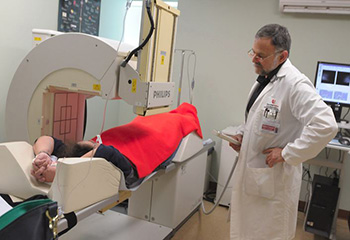FULLY ACCREDITED LABS

Having fully accredited labs onsite means that we adhere to strict government and cardiology professional society guidelines that help ensure safety and accuracy in sample gathering and test results, and reimbursement from your health insurance provider.
- Echocardiography Laboratory
- Nuclear Cardiography Laboratory
- Vascular Laboratory
IN-OFFICE TESTING & PROCEDURES:
 Nuclear imaging - PET/SPECT: A method for producing images of your various body parts using small amounts of radioactive tracers to help physicians diagnose certain conditions.
Nuclear imaging - PET/SPECT: A method for producing images of your various body parts using small amounts of radioactive tracers to help physicians diagnose certain conditions.- Echocardiography: A sonogram of the heart that utilizes sound waves to perform non-invasive images of your heart to rule out structural heart abnormalities.
- Treadmill stress testing: A non-invasive way to evaluate for obstructive coronary artery disease known as blockages in your coronary arteries.
- Vascular testing: These non-invasive tests evaluate for peripheral arterial and venous disease and can identify obstructions in your blood flow, including venous blood clots and arterial plaquing.
- Holter monitoring: Continuously records your heart's rhythms and is usually worn for 24–48 hours during normal activities. This test is often used to diagnose arrhythmias.
- Loop recorders: A minimally invasive procedure where we implant a loop recorder under the skin in a simple 5-minute office procedure. This device allows us to monitor your heart rhythm to detect potentially life-threatening heart rhythms. This device has a battery life that lasts up to 3 years, it is MRI compatible, won't interfere with your quality of life and can be removed easily.
OUT-OF-OFFICE TESTING & PROCEDURES:
- LARIAT Left Atrial Appendage Exclusion: An innovative, minimally invasive procedure for placing a lasso suture around the part of the heart in which 90% of blood clots form. It is designed for patients with atrial fibrillation who are at high risk for stroke.
- Cryothermal Ablation: A cutting edge, minimally invasive technology for cardiac ablations using freezing (cryo) energy instead of electrocautery energy. Cyro energy results in less pain and faster recovery times for patients having atrial fibrillation ablation.
- Coronary angiography: A test that uses a contrast agent such as a dye and special x-rays to show the inside of the coronary arteries that supply oxygen-rich blood to your heart. It is used to check for obstructive plaque (fatty build-up) in your arteries. Click here for more information
- Angioplasty/stenting: A non-surgical procedure used to open blocked heart arteries by temporarily inserting a tiny balloon to help widen the artery, most often by placing a metal stent (small coil tube) in your artery to prevent recoil, and decrease the risk of it narrowing again.
- Peripheral angiography: An invasive diagnostic test to rule out obstruction of the arteries in your upper extremities, lower extremities, and kidneys.
- Peripheral angioplasty/stenting: The use of a balloon, or another device to restore blood flow through blocked blood vessels in the upper extremities, lower extremities, or kidney arteries.
- Catheter ablations: A minimally invasive procedure used to remove a faulty electrical pathway from your heart if you are prone to developing cardiac arrhythmias.
- Electrophysiology studies: A minimally invasive procedure that tests the electrical conduction system of your heart and is used to investigate the cause, location and best treatment for various abnormal heart rhythms.
- Pacemakers & defibrillators: Implantable devices to treat life-threatening arrhythmias (both fast and slow).
- Cardiac resynchronization therapy: A pacemaker-based therapy for heart failure.
- Transesophageal echocardiography (TEE): An alternate way to perform an echocardiogram when a more clear and precise image is needed for the assessment.
- Coronary computed tomography imaging: An x-ray test that takes clear, detailed pictures of your heart to look for problems, during which an iodine-based dye (contrast dye) is sometimes injected into one of your veins.
- Cardiac calcium scoring: Uses a special x-ray test called computed tomography (CT) to check for the buildup of calcium in plaque on the walls of your coronary arteries. It is used to diagnose early-stage heart disease and determine how severe it is. It is also called coronary artery calcium scoring.
- Event recording: A process used to record your ECG (electrocardiogram) over a period of time to identify and diagnose cardiac problems such as heart arrhythmias.

